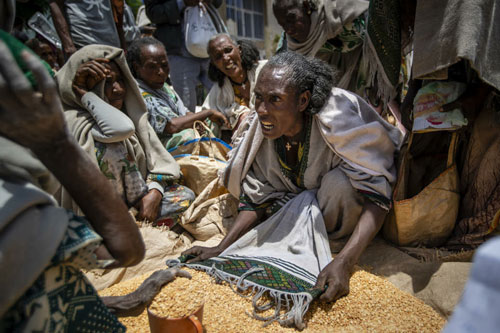Abi Adi, Ethiopia
First the Eritrean soldiers stole the pregnant woman’s food as she hid in the bush. Then they turned her away from a checkpoint when she was on the verge of labor.
So she had the baby at home and walked 12 days to get the famished child to a clinic in the northern Ethiopian region of Tigray.
At 20 days old, baby Tigsti still had shriveled legs and a lifeless gaze — signs of what the United Nations’ top humanitarian official calls the world’s worst famine conditions in a decade.
“She survived because I held her close to my womb and kept hiding during the exhausting journey,” said Abeba Gebru, 37, a quiet woman from Getskimilesley with an amulet usually worn for luck around her left wrist.
Here, in war-torn Tigray, more than 350,000 people already face famine, according to the U.N. and other humanitarian groups.
It is not just that people are starving; it is that many are being starved, The Associated Press found.
In farming areas in Tigray to which the AP got rare access, farmers, aid workers and local officials confirmed that food had been turned into a weapon of war.
Ethiopian and Eritrean soldiers are blocking food aid and even stealing it, they said, and an AP team saw convoys with food and medical aid turned back by Ethiopian military officials as fighting resumed in the town of Hawzen.
The soldiers also are accused of stopping farmers from harvesting or plowing, stealing the seeds for planting, killing livestock and looting farm equipment.
More than 2 million of Tigray’s 6 million people have already fled, unable to harvest their crops. And those who stayed often cannot plant new crops or till the land because they fear for their lives.
“If things don’t change soon, mass starvation is inevitable,” said a humanitarian worker in the region, who spoke on the condition of anonymity to escape retaliation from armed groups.
“This is a man-made disaster.”
The full extent of the hunger is hard to pin
down because officials — and food aid — still cannot get into the remotest parts of a region known for its rugged inaccessibility even in the best of times.
The U.N. World Food Program on Thursday said it had gotten aid to 1.4 million people in Tigray, “barely half of the number we should be reaching,” in part because armed groups were blocking the way.
For every mother like Abeba who makes it out, hundreds, possibly thousands, are trapped behind the front lines or military roadblocks in rural areas.
“Most of the malnourished children, they die there,” said Dr. Kibrom Gebreselassie, chief medical director of Ayder Hospital in Mekele. “This is a tip of the iceberg.”
The grinding war in Tigray started in early November, shortly before the harvest season, as an attempt by Ethiopian Prime Minister Abiy Ahmed to disarm the region’s rebellious leaders.
On one side are guerrillas loyal to the ousted and now-fugitive leaders of Tigray. On the other are Ethiopian government troops, allied troops from neighboring Eritrea and militias from the Amhara ethnic group. Trapped in the middle are the civilians of Tigray.
The war has spawned massacres, gang rapes and the widespread expulsion of people from their homes, and the United States has declared “ethnic cleansing” in western Tigray. Now, on top of those atrocities, Tigrayans face another urgent problem: hunger and starvation.
The deputy CEO of the region, Abebe Gebrehiwot, echoed the assessment of “ethnic cleansing” and said combatants are blocking food aid from reaching those who need it. He said the region’s interim administration, appointed by Abiy, is desperately trying to forestall a famine, including in the areas where Eritrean forces remain in charge.
“There are some players who don’t want us to…plow the land,” he said in a recent interview. “There are some players who (prevent) us from distributing the seeds.”
Ethiopia’s government strongly disputes that starvation is being used as a weapon of war.
Mitiku Kassa, an official with the National Disaster Risk Management Commission, said Wednesday that the U.N. and nonprofit groups have “unfettered access” to Tigray, and that food aid worth about $135 million has been distributed.
“We don’t have any food shortage,” he declared. That’s not what the AP found out on the ground.
Teklemariam Gebremichael and his neighbors said he and his neighbors were no longer allowed to farm. When Eritrean soldiers came upon him looking after his cattle and harvesting crops, they shot both him and his cows, he said.
He survived. The cows didn’t. With food in short supply, his wound is slow to heal. “I call on the world has to take immediate action to help Tigray, because we can’t live on our own land anymore,” he pleaded.—AP










